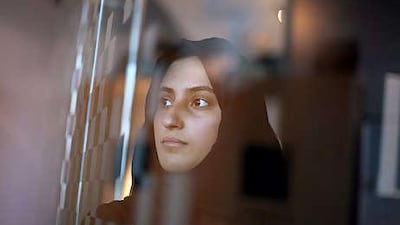DUBAI // Film means empowerment for Shaikha al Ayali, an award-winning filmmaker who is among a new wave of Emirati directors documenting their own lives, and the state of the nation as they see it.
Among her films so far have been a short public service documentary on domestic violence, and a new film on hip-hop in the UAE, which won the Emirates Foundation Award. "Before it was very hard for a woman to speak up, but now we should challenge society," said Ms al Ayali, 22. "As girls, we should debate." The communications graduate from Dubai Women's College said her training helped her tap an inner voice she never knew she had.
"When I first held the camera I felt there was something else in me that I wanted to show the people," she said. "This is my second eye. When you show people visuals, what you want to say reaches their mind, their heart." The film on domestic violence features a young woman seated in a kitchen, who flinches when she hears her husband's heavy footsteps approach. The woman does not react when he glares at her, then places a mug down on the table with a thud, and leaves the room.
But then she turns to reveal to viewers the other side of her face, and the camera rests on her bruises. "The violence is on her face," said Ms al Ayali. "My message is for women being beaten. "My message is that one million women [in the Middle East] suffer violence from their husbands." Making the film was beset with difficulties. Her brother and a classmate had to fill in when the actors she approached backed out due to the sensitivity of the subject.
"Sometimes you can't talk to people, or to society, face to face," she said. "You can't say 'this is wrong'. "But the camera can take the picture of what you want to say, and then you can show it to people. They may understand it." Despite the deadly seriousness of her subject matter, Ms Ayali remains vibrant and cheerful. She gains strength from her mother, who accompanied her to sit in on the interview. "She said when you love something, you will work hard and succeed," Ms Ayali said.
"Our generation of Emiratis, they want to do something. "They want to show what they have - their talent, their skill." Ms Ayali's latest project looked at the local rap music scene, in a collaboration with two friends at Dubai's Global Village. Her film, Heat The Beat, which featured three Emirati music groups, was one of 13 selected nationwide to be screened at April's Gulf Film Festival. And more and more Emirati filmmakers are using realism as a means to address their subject, say film critics.
The Emirati film City of Life, by the director Ali Mostafa, features an unmarried pregnant woman considering abortion. The director Nayla al Khaja has tackled child abuse, while gang violence was the focus of Nawaf al Janahi's The Circle. Critics see great promise in the current generation of filmmakers, who like Ms al Ayali say they do not intend to shock viewers but simply create compelling cinema.
Yet social-issue films made by Emiratis have all the more power in bringing issues under the spotlight, said Janet Bellotto, the assistant chair of visual communications at Zayed University. "An Emirati will know how to approach that conversation better," she said. "People will have more trust in someone who is born here, and is from the same culture and traditions." Ms Ayali feels she still has some barriers to breach when it comes to cultural taboos. It can be difficult for a woman from a conservative background to convince other Emiratis to give voice to their views.
"I feel like it [the camera] is protecting me," she said. "I can translate what people say with their eyes - like they think it's a guy's job, not a lady's." @Email:rtalwar@thenational.ae


